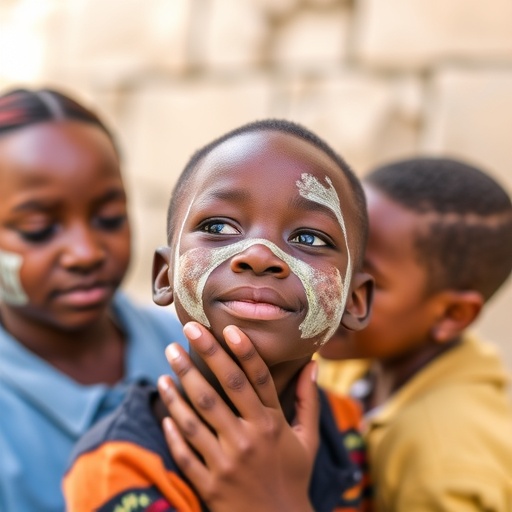The COVID-19 pandemic unleashed an unprecedented global crisis, impacting every facet of life with particularly devastating consequences for vulnerable populations. In South Africa, a nation already grappling with socioeconomic disparities and a complex public health landscape, the implementation of stringent COVID-19 restrictions profoundly disrupted child services and, by extension, the well-being of its youngest citizens. Recent research led by Marais, Matamanda, Gbadegesin, and colleagues has illuminated the contours of this crisis, revealing an unsettling portrait of how pandemic mitigation measures affected essential services for children and the cascading repercussions on their physical, emotional, and social health.
Central to the report is the recognition that child services in South Africa, which include healthcare, nutrition programs, education, and social support systems, are uniquely sensitive to structural shocks. These services, already under strain before the pandemic, were hampered by national lockdowns, movement restrictions, and resource reallocations intended to curb the viral spread but inadvertently curtailed access to vital support for children. The forced suspension or modification of these programs left many children isolated from the critical networks that ensure their development and protection.
At the heart of the issue, the research identifies how the interruption of school-based services during lockdowns severely limited children’s access to not only education but also nutrition and psychosocial support. Schools in South Africa, particularly in disadvantaged areas, operate as hubs for child welfare; they provide meal programs essential for combating childhood malnutrition and serve as venues for identifying and responding to cases of abuse and neglect. When these institutions closed their doors, millions of children were cut off from these lifelines at a time when family stressors and vulnerabilities exacerbated risks at home.
Healthcare delivery faced similar disruptions. Routine immunizations and health screenings dwindled as clinics reduced services or prioritized COVID-19 response efforts. The subsequent decrease in healthcare access threatened to reverse hard-won gains against preventable diseases and increased anxiety surrounding child health management. The study documents that even immunization rates for critical vaccines showed marked declines, exposing children to elevated risks of outbreaks in the wake of the pandemic.
Another dimension extensively analyzed by the researchers is the social protection framework surrounding children. COVID-19 restrictions interrupted social grant distributions and community-based support programs, which are indispensable for households battling poverty and food insecurity. This interruption intensified vulnerabilities and heightened incidences of malnutrition and mental health challenges among children, particularly in low-income communities. The stress on caregivers, often unemployed or facing increased economic hardship during the pandemic, compounded the pressures on children’s well-being.
Moreover, the study underscores the heightened risk of domestic violence and child abuse, phenomena exacerbated by lockdowns and the consequent confinement to unsafe environments. The inability of social workers and child protection services to operate normally due to movement limitations or health risks further complicated intervention and support, leaving many children trapped in harmful situations without respite or aid.
Technology and remote communication emerged as partial mitigants but also exposed glaring inequalities. While some educational institutions and social services pivoted to digital platforms, widespread disparities in internet access and device availability meant that many children in rural and under-resourced areas were effectively excluded from such alternatives. This digital divide reinforced pre-existing inequities and dampened the effectiveness of remote child services.
The mental health repercussions of these disruptions are addressed with particular urgency in the research. Isolation, anxiety, and grief linked to the pandemic’s direct and indirect impacts on families translated into increased psychological distress among children. Mental health resources, already scarce, became even more difficult to access, highlighting a significant gap in the pandemic response with long-term implications.
On a broader scale, the research offers critical insights into policy responses and adaptive strategies. It advocates for a multidimensional and integrated approach to child services that prioritizes resilience, flexibility, and inclusion. The findings suggest the necessity for robust contingency planning to maintain service delivery during public health emergencies, protecting children’s rights and needs amid crises.
Importantly, the study recommends strengthening community-based interventions and enhancing caregiver support systems to buffer against the socio-economic shocks that exacerbate risks to children. This includes reinforcing nutritional aid programs, expanding mental health services, and ensuring the continuity of child protection mechanisms even in times of restricted mobility.
The researchers also call for leveraging technology innovatively while urgently addressing the digital divide to democratize access to remote learning and social support. Investing in infrastructure, affordable connectivity, and digital literacy emerged as prerequisites for safeguarding child services in any future disruptions.
At a scientific level, the study exemplifies an interdisciplinary methodology, combining quantitative data analysis with qualitative community insights to capture a comprehensive picture of the pandemic’s multidimensional impacts. This methodological rigor enriches the evidence base needed to inform policymakers, child welfare practitioners, and international bodies.
The implications of this research extend beyond South Africa, as many countries with similar socio-economic profiles experienced comparable challenges during the COVID-19 pandemic. The contextualized lessons offer a framework for international dialogue on balancing disease containment with safeguarding holistic child welfare.
In sum, the study by Marais, Matamanda, Gbadegesin, and their team sheds light on an issue of profound importance—the intersection between public health emergency measures and child welfare systems. It compellingly argues that pandemic responses must integrate social considerations more deliberately to prevent collateral damage to children’s developmental trajectories.
As the world navigates post-pandemic recovery, these insights provide a clarion call to rebuild child services with resilience and inclusivity at their core. Ensuring children’s well-being in crises is not only a humanitarian imperative but a foundational investment in society’s future stability and prosperity.
Subject of Research: The impact of COVID-19 restrictions on child services and the well-being of children in South Africa.
Article Title: The COVID-19 restrictions, child services and the well-being of children in South Africa.
Article References:
Marais, L., Matamanda, A., Gbadegesin, F. et al. The COVID-19 restrictions, child services and the well-being of children in South Africa. ICEP 18, 12 (2024). https://doi.org/10.1186/s40723-024-00138-7
Image Credits: AI Generated
DOI: https://doi.org/10.1186/s40723-024-00138-7




